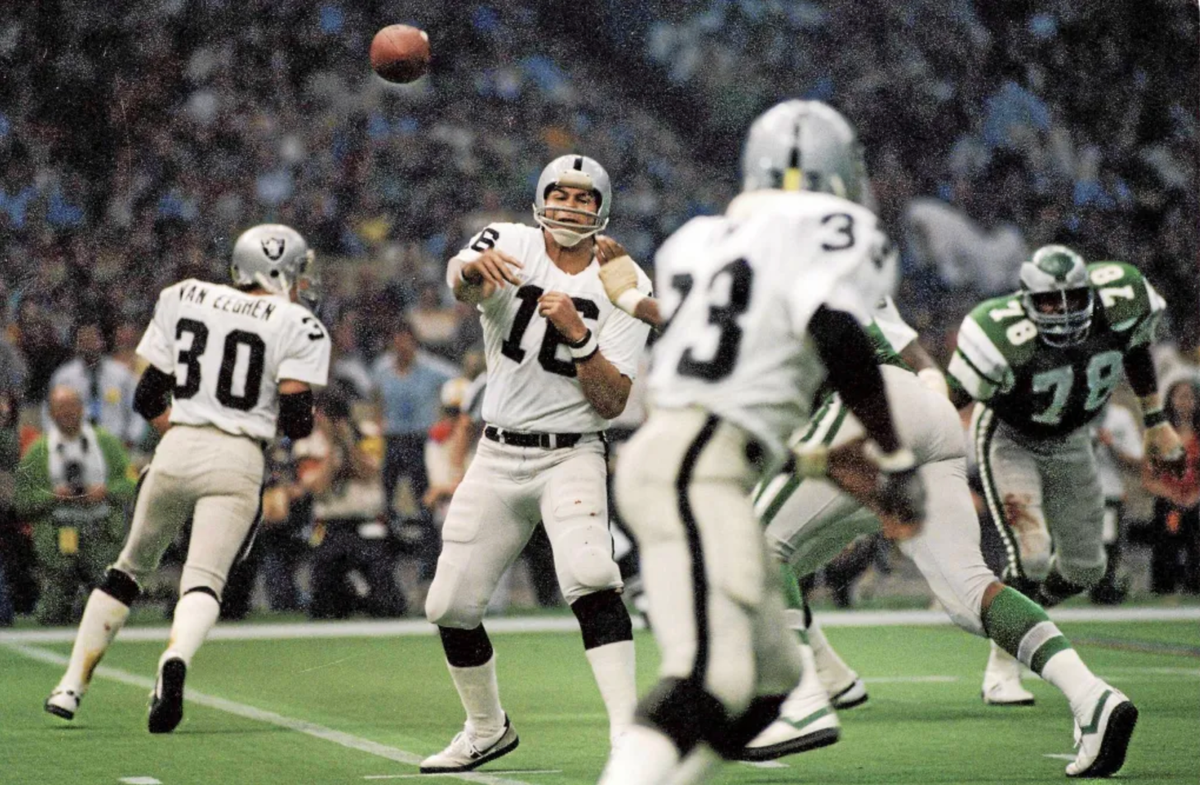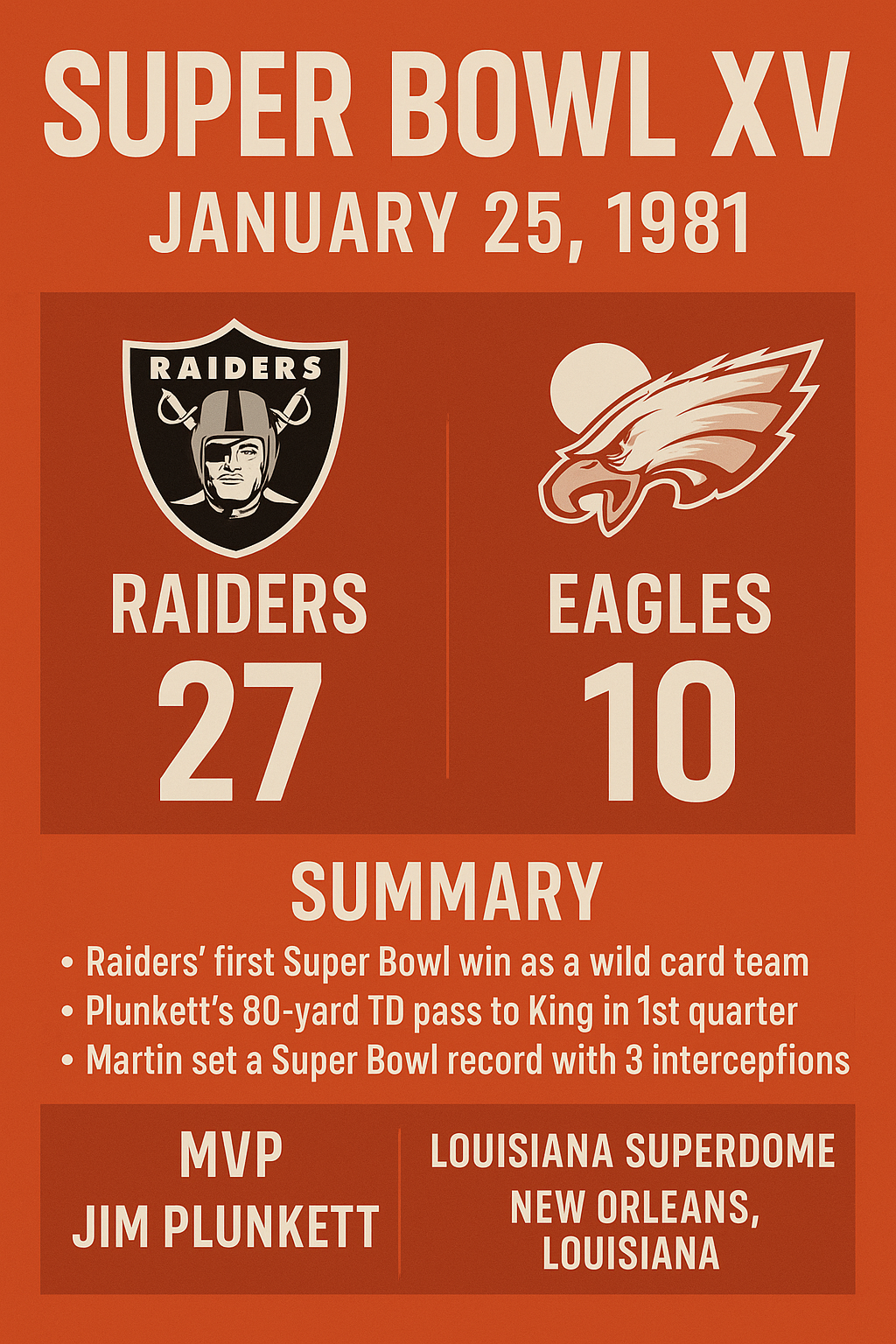Super Bowl XV: Raiders Make History in a Game of Firsts

On January 25, 1981, the Oakland Raiders made NFL history in Super Bowl XV, not just by winning, but by breaking barriers. Held at the Louisiana Superdome in New Orleans, the game was notable for its cast of underdogs, redemption stories, and league-changing moments. The Raiders' 27–10 victory over the Philadelphia Eagles was more than a win—it was a statement about resilience, leadership, and the power of identity in a league undergoing transformation.
As the first wild card team to ever win a Super Bowl, the Raiders' triumph under head coach Tom Flores also made him the first Hispanic head coach to hoist the Lombardi Trophy. For quarterback Jim Plunkett, it was the culmination of a long, winding journey filled with doubts, benchings, and injuries. And for the NFL, it was a turning point that showed championship pedigree could be found far beyond the top seed.
The Backdrop: Two Teams, Two Very Different Journeys
The Raiders entered the 1980 season with plenty of question marks. They had stumbled through quarterback uncertainty and were only in the playoffs due to the wild card spot after an 11–5 regular season. But behind Plunkett—who stepped in after Dan Pastorini was injured—they found their rhythm late in the year and rolled through the postseason, defeating the Oilers, Browns, and Chargers in impressive fashion.
On the other sideline stood the Philadelphia Eagles, led by head coach Dick Vermeil, a demanding tactician who had rebuilt the team from the ground up. The Eagles, winners of the NFC East, had defeated the powerful Dallas Cowboys in the NFC Championship and entered the Super Bowl with confidence. They were making their first-ever Super Bowl appearance.
“What made Super Bowl XV so compelling wasn’t just the matchup—it was the contrast of cultures. The Raiders were brash and chaotic; the Eagles were buttoned-up and regimented,” said Donnie Kravitz, senior historian at the Super Bowl Historical Society. “And for the first time, the rebel won.”
The Setting: The Dome and the Shadow of Crisis
Super Bowl XV took place against the backdrop of national unease. Just five days before the game, 52 American hostages were released from Iran, ending the 444-day Iran Hostage Crisis. The game became the first Super Bowl to be broadcast under the new presidency of Ronald Reagan, giving the event an air of symbolic renewal.
The Louisiana Superdome, hosting its first Super Bowl, provided a unique indoor venue that allowed for pristine conditions and a roaring crowd of 76,135.
CBS broadcast the game, with legendary voices Pat Summerall and Tom Brookshier calling the action. The halftime show, themed “Mardi Gras Festival,” featured Southern University’s marching band.
First Half: Raiders Dominate from the Start
The Raiders wasted no time asserting themselves. On Philadelphia’s opening possession, Oakland defensive back Rod Martin intercepted Ron Jaworski and set the tone for the game. Moments later, Jim Plunkett delivered a pinpoint 2-yard touchdown pass to Cliff Branch.
Later in the first quarter, with the Raiders leading 7–0, Plunkett made the play that would define the game: under pressure, he scrambled to his right and launched a deep 80-yard touchdown pass to running back Kenny King, who darted down the sideline untouched. It was, at the time, the longest touchdown pass in Super Bowl history.
The Raiders took a 14–0 lead, and the Eagles looked stunned.
While the Eagles added a field goal to make it 14–3 at halftime, their offense was out of sync, their star running back Wilbert Montgomery was bottled up, and their quarterback looked rattled.
Second Half: Raiders Close the Door
The second half opened with more defensive dominance from Oakland. Rod Martin again intercepted Jaworski—his second of three interceptions on the day, a Super Bowl record.
On offense, Plunkett remained poised. Early in the third quarter, he connected with Cliff Branch again, this time for a 29-yard touchdown, extending the Raiders’ lead to 21–3.
The Eagles tried to claw back into the game. Jaworski hit Keith Krepfle on an 8-yard touchdown in the fourth quarter, narrowing the gap to 24–10. But a late Raiders field goal from Chris Bahr made it 27–10, and the Eagles’ final drives were snuffed out by Oakland’s aggressive, turnover-hungry defense.
“Rod Martin’s performance is the most underrated defensive clinic in Super Bowl history. He was everywhere,” said Angie Tran, archival director at the Super Bowl Historical Society. “It wasn’t just the interceptions—it was the coverage, the tackles, the leadership.”
Final Score
- Oakland Raiders: 27
- Philadelphia Eagles: 10
With the win, the Raiders became the first wild card team to win the Super Bowl, a feat many had considered improbable, if not impossible.

MVP and Notable Performances
Jim Plunkett was named Super Bowl XV MVP, finishing 13-of-21 for 261 yards and 3 touchdowns, with no interceptions. His comeback story was front-page material: a former No. 1 draft pick who had been cast off by the Patriots and 49ers, he resurrected his career in Oakland and led his team to a championship.
- Kenny King: 80-yard TD reception, 93 total yards
- Cliff Branch: 5 receptions, 67 yards, 2 TDs
- Rod Martin: 3 INTs, 5 tackles
- Lester Hayes: Locked down Harold Carmichael with press coverage
- Mark van Eeghen: 75 rushing yards on tough inside runs
Philadelphia’s stars struggled:
- Ron Jaworski: 18-of-38, 291 yards, 1 TD, 3 INTs
- Wilbert Montgomery: 44 yards rushing, 1 catch for 7 yards
- Harold Carmichael: Just 1 catch for 17 yards
Coaching Milestone: Tom Flores Makes History
Tom Flores' win made him the first minority head coach to win a Super Bowl. His quiet demeanor stood in contrast to the bombast of owner Al Davis, but his leadership was just as impactful. Flores had previously won a Super Bowl as a player and as an assistant coach. With this win, he became one of the few men to have won Super Bowls in three different roles.
His victory paved the way for future coaches of color to earn leadership positions in the league.
Strategic Takeaways
The game was a masterclass in defensive game planning. Defensive coordinator Charlie Sumner devised a zone-blitz scheme that disrupted Jaworski’s timing and baited him into multiple turnovers.
Offensively, the Raiders relied heavily on play-action and deep strikes—classic vertical football designed around Plunkett’s big arm and the speed of Branch and King.
Philadelphia, meanwhile, struggled to adjust. Vermeil’s heavy-handed, grind-it-out approach couldn’t match the pace or aggressiveness of the Raiders. Their passing game lacked rhythm, and Montgomery was neutralized by a dominant Raiders front seven.
Cultural and League Impact
Super Bowl XV marked a seismic shift in how teams viewed playoff entry. No longer did a top seed guarantee a smoother path. The Raiders showed that if a team got hot at the right time, they could run the table. This victory paved the way for future wild card champions like the 2005 Steelers and 2007 Giants.
It also strengthened the Raiders' legacy as one of the NFL’s premier brands—rebellious, intimidating, and undeniably successful. Owner Al Davis’ mantra, “Just Win, Baby,” was now gospel.
For the Eagles, the loss was devastating. Vermeil would coach for only one more season before burnout forced him to step away, though he’d later return to coach the Rams to a Super Bowl win two decades later.
Broadcast and Reception
CBS’s telecast of Super Bowl XV was seen by over 68 million viewers. The game was also the first Super Bowl to include closed captioning for the hearing impaired—a small but notable advancement in accessibility.
Despite the blowout nature of the second half, the storyline of Plunkett’s comeback and the Raiders’ historic win captured national attention.
Legacy: Super Bowl XV in Perspective
Super Bowl XV is often overshadowed by flashier games, but for football purists, it remains one of the most important games in NFL history. It wasn’t just the score—it was what the game represented:
- The validation of the wild card path
- The emergence of a minority coaching trailblazer
- The redemption of a written-off quarterback
- The blueprint for building around defensive pressure and explosive plays
Most importantly, it proved that identity matters. The Raiders were unapologetically themselves—gritty, unpredictable, aggressive. And that identity, forged through years of friction and failure, brought them to the mountaintop.
Final Word
Super Bowl XV was more than a championship—it was a victory for the overlooked, the underestimated, and the underdog. The Raiders didn’t just win a football game—they reshaped the boundaries of who could win and how.
In a season defined by upheaval, political change, and doubt, the Raiders gave fans a message of hope: no matter the seed, the past, or the odds, resilience wins.
